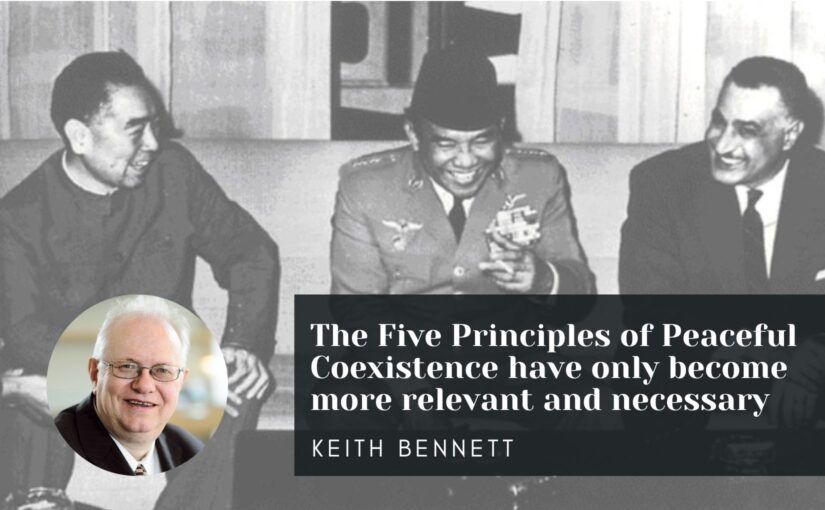China marked the 70th anniversary of the Five Principles of Peaceful Coexistence on June 28, with an international conference that featured a major speech by President Xi Jinping and the adoption of a Joint Declaration. The five principles were first advanced by Premier Zhou Enlai and endorsed jointly with the leaders of India and Myanmar (Burma). They went on to become a widely accepted norm of international relations.
The following is a brief commentary regarding the background and significance of the Five Principles, written by our co-editor Keith Bennett in advance of the conference. Keith notes that the question of relations between socialist and non-socialist countries arose with the victory of the October Revolution and was first addressed by Lenin. Zhou Enlai’s development of Lenin’s concept was made against the background of such great world events as the emergence of a socialist camp, the defeat of fascism and the founding of the United Nations, and the upsurge in the struggles for national liberation that would lead to the birth of the Non-Aligned Movement and the rise of the Global South. The five principles are needed more than ever today, with humanity facing a number of existential threats.
Part of the commentary featured in an article on China Daily.
The 70th anniversary of the Five Principles of Peaceful Coexistence being advanced by Premier Zhou Enlai represents a very significant milestone in the long march towards a post-colonialist, post-imperialist new world order that is genuinely peaceful and equitable.
The five principles were formulated by Premier Zhou, in my view the greatest diplomat of the twentieth century, in the midst of profound global changes and in particular three separate but closely inter-related phenomena, namely:
- The emergence of socialism not simply as an idea but as a reality holding state power, initially in one country but then in a socialist camp embracing much of Europe and Asia.
- The defeat of fascism in 1945 and the formation of the United Nations aimed at preventing war and promoting democratic global governance.
- The upsurge of the national liberation movements and the beginning of the great waves of decolonisation that would lead to the formation of the Non-Aligned Movement and the later emergence and rise of the Global South.
The Chinese revolution itself, and the founding of the People’s Republic, reflected and impacted all these three historical currents.
The October Revolution, and the founding of the Soviet state, had inevitably raised the question of what relationship a socialist country should have with the capitalist powers, and it was on this basis that Lenin advanced a policy of peaceful coexistence.
Zhou Enlai applied and developed this concept with an appreciation that the existence of states with fundamentally different social systems, and hence the need for their coexistence, was not a mere transient phenomenon but rather a reality that would exist for an entire historical period and therefore could not be simply treated as a temporary expedient or tactic but needed to be raised to the level of theory.
His thinking also embodied Chairman Mao Zedong’s concept of there being both antagonistic and non-antagonistic contradictions, as well as the possibility for even actually or potentially antagonistic contradictions to be handled in a non-antagonistic fashion and, in such a way, for their nature to be ameliorated, modified or transformed.
Specifically, the collapse of the colonial empires, and the rise of new emerging forces throughout Asia, Africa and elsewhere, meant that a new world was coming into being, comprised of countries with different social systems, cultures, religious beliefs, and so on, but who shared important common interests of being for independence against imperialism and with them all facing the common needs of development, modernization and poverty alleviation. This provided the basis for Premier Zhou to agree the five principles with India’s first Prime Minister Jawaharlal Nehru and for them to form the bedrock of the 10 principles adopted by the Afro-Asian Conference held in the Indonesian city of Bandung the following year.
A key test of the correctness or otherwise of a set of principles is whether or not they stand the test of time. Over the last 70 years, the Five Principles have only become more relevant and necessary. Embodying the principles of the United Nations Charter, and representing the interests of the great majority of the people in every country, they are welcomed and supported by the overwhelming majority of states. Moreover, their virtue and necessity can be seen in the appalling tragedies that result from a failure to uphold them but rather to pursue an alternative course, whether in Iraq, Afghanistan and, of course, above all today in Palestine.
The Five Principles are in turn embodied and being further developed and applied in the important global initiatives put forward by President Xi Jinping with regards to security, development and civilization, along with the Belt and Road Initiative. As with Premier Zhou’s initiative seven decades ago, these initiatives are increasingly widely welcomed by countries and peoples around the world, addressing as they do the key questions and imperatives of peace and development, along with the correct and realistic ways to tackle the existential threats currently facing humanity, such as those of nuclear war, climate catastrophe, zoonotic pandemics, antimicrobial resistance, or a collapse in biodiversity, and to promote the building of a community of shared future for humanity.

